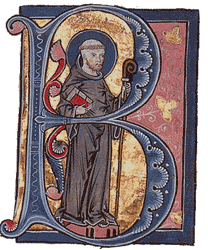“Pride goeth before destruction and the spirit is lifted up before a fall.” Proverbs 16:18 (Douay-Rheims)
Pride (superbia) was the foundation of all sin in medieval piety and theology. A concept well-established on the Bible and the Church Fathers, pride was the devil’s original sin. Augustine of Hippo explained that pride was the original sin of human beings and led to The Fall and its horrible consequences. Citing Ecclesiasticus 10:14-15 to demonstrate this theological teaching, he asserted that pride led the devil to tempt humanity out of envy. He appealed to humanity’s pride through the lie that they would be like gods. [Augustine, On Nature and Grace 33.29. Idem, City of God 12. 6.]
Augustine defined pride as the evil will from which the rebellious action against God’s commandment arose. Pride, defined as the love of one’s own excellence, began as a voluntary choice to move away from the changeless Good (i.e., God) and to perversely exalt the self. Augustine identified this self-centered exaltation as the main character trait of the community of sinful human beings. [Augustine City of God 14. 13. Idem, De Genesi ad litteram 11. 14. 18]
Twelfth-century monastic theologians particularly focused on pride as the source of the  soul’s demise.(See John of Salisbury’s Description of Pride) In fact, as we read in the Rule of St Benedict the entire monastic way of life rested on self-denial as the means to humble one’s sinful pride. Bernard of Clairvaux integrated the Augustinian theological tradition with Benedict’s practice. His first published work was a devotional exposition of Benedict’s description of the monastic life as a ladder of humility. In this work, Bernard explained the twelve steps of humility and pride. He followed Augustine’s definition of pride as the love of one’s own excellence. According to Bernard, pride reaches its culmination in the habit of sinning driven by cupidity (cupiditas) [Bernard of Clairvaux, The Steps of Humility and Pride 4. 14, 21. 51, trans. M. Ambrose Conway OCSO. Kalamazoo 1989, 42, 77-78.]
soul’s demise.(See John of Salisbury’s Description of Pride) In fact, as we read in the Rule of St Benedict the entire monastic way of life rested on self-denial as the means to humble one’s sinful pride. Bernard of Clairvaux integrated the Augustinian theological tradition with Benedict’s practice. His first published work was a devotional exposition of Benedict’s description of the monastic life as a ladder of humility. In this work, Bernard explained the twelve steps of humility and pride. He followed Augustine’s definition of pride as the love of one’s own excellence. According to Bernard, pride reaches its culmination in the habit of sinning driven by cupidity (cupiditas) [Bernard of Clairvaux, The Steps of Humility and Pride 4. 14, 21. 51, trans. M. Ambrose Conway OCSO. Kalamazoo 1989, 42, 77-78.]
My next post will discuss humility (humilitas).

Pingback: Pride | Steadfast Lutherans